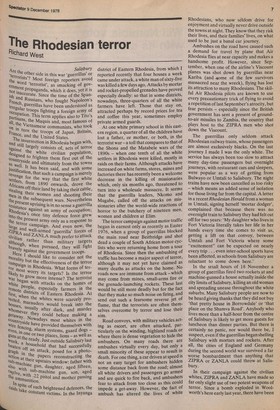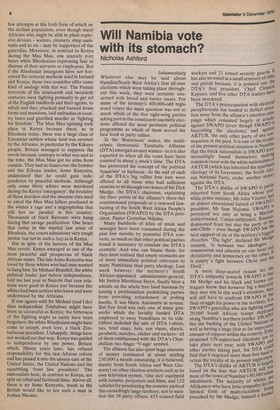The Rhodesian terror
Richard West
Salisbury Are the other side in this war 'guerrillas or terrorists'? Most foreign reporters avoid the word 'terrorist', as smacking of government propaganda, which it does, yet a is ot inaccurate. Since the time of the Spanish and Russians, who fought Napoleon s French, guerrillas have been understood as irregular troops fighting a foreign army Occupation. This term applies also to Tito 's of Partisans, the Maquis and, most famous of all, the Vietnamese communists, who.too k on in turn the troops of Japan, Britain, France, and the United States. The insurrection in Rhodesia began with, and. still largely consists of, acts of terror against the white civilian population, designed to frighten them first out of the countryside and ultimately from the towns a, s well. It has been said, and with some justification, that such a campaign is merely revenge for the way that the first white settlers, from 1890 onwards, drove the Africans off their land by taking their cattle, stealing their women and shooting their men in the subsequent wars. Nevertheless the present uprising is in no sense a guerrilla Rresistance against an army of occupation; hodesia's once tiny defence force grew into the present army only as a response to the terror campaign. And even now, the large and well-armed 'guerrilla' forces of `-.IPRA and ZANLA much prefer to attack civilian rather than military _although, _although, when pursued, they will fight bravely against the government troops. Here I should like to consider not the morality but the effectiveness of the terror .campaign in Rhodesia. What forms of terr.or most worry its targets? Is the terror likely to grow more intense? The terrorist War began with attacks on the homes of White people, especially farmers in the remote rc districts of Eastern Rhodesia. At .irst, when the whites were scarcely proL'ected, marauders would break into the li°uses, usually after dark, and murder Whomever they could before making a getaway Nowadays most whites in the cOuntryside have provided themselves with w__Ire fencing, alarm systems, guard dogs even, in one or two places, lions as well as _guns at the ready. Just outside Salisbury last ,week, a household that had successfully neate n _off an attack, posed for a photo ..1aPII in the papers reconstructing the sdetibon at their upstairs window: father with 'machine gun, daughter, aged fifteen, r so with sub-machine gun, son, aged 4elve, with .22 piStol and mother e aMmunition. passing r .In spite of such heightened defences, the aids take constant victims. In the Inyanga district of Eastern Rhodesia, from which I reported recently that four houses a week came under attack, a white man of sixty-five was killed a few days ago. Attacks by mortar and rocket-propelled grenades have proved especially deadly: so that in some districts, nowadays, three-quarters of all the white farmers have left. Those that stay on, attracted perhaps by record prices for tea and coffee this year, sometimes employ private armed guards. At one white primary school in this eastern region, a quarter of all the children have lost a father, or mother, or both, in the terrorist wara toll that compares to that of the Shona and the Matabele wars of the 1890s when one tenth of all the white settlers in Rhodesia were killed, mostly in raids on their farms. Although attacks have increased on white farms, stores, mines and factories there has recently been a welcome decrease in the killing of missionaries which, only six months ago, threatened to turn into a wholesale massacre. It seems that the guerrilla leaders, Nkomo and Mugabe, called off the attacks on missionaries after the world-wide reactions of horror to the butchery of nineteen men, women and children at Elim. The terror campaign against motor traffic began in earnest only as recently as Easter 1976, when a group of guerrillas blocked the main road near Beitbridge and shot dead a couple of South African motor cyclists who were returning home from a tour of Rhodesia. Since then the ambushing of traffic has become a major aspect of terror, although it may not yet have claimed as many deaths as attacks on the home. No roads now are immune from attack which may come from mines, small-arms fire or the grenade-launching rockets. These last would be still more deadly but for the fact that they make so much noise on firing, and send out such a fearsome reverse jet of flame, that the terrorists are often themselves overcome by terror and lose their aim.
Road convoys, with military vehicles acting as escort, are often attacked, par ticularly on the winding, highland roads or where there is dense vegetation to hide the ambushers. On many roads there are ambushes virtually every day, but only, a small minority of these appear to result in death. For one thing, a car driven at speed is not an easy target for ambushers hidden some distance back from the road; almost all white drivers and passengers go armed and are quick to fire back, and ambushers fear to attack from too close as this could impede a get-away. However, the fact of ambush has altered the lives of white Rhodesians, who now seldom drive for enjoyment and virtually never drive outside the towns at night. They know that they risk their lives, and their families' lives, on what used to be just a banal car journey.
Ambushes on the road have caused such a demand for travel by plane that Air Rhodesia flies at near capacity and makes a handsome profit. However, since September, when one of the airline's Viscount planes was shot down by guerrillas near Kariba (and dome of the few survivors massacred near the wreck), flying has lost its attraction to many Rhodesians. The skilful Air Rhodesia pilots are known to use every precautionary trick of flying to avoid a repetition of last September's atrocity, but fear persists especially since the British government has sent a present of groundto-air missiles to Zambia, the country that plays host to the ZIPRA men who shot down the Viscount.
The guerrillas only seldom attack Rhodesian railway trains, whose passengers are almost exclusively blacks. On the last journey I made I was the only white. The service has always been too slow to attract many day-time passengers but overnight journeys, with restaurant cars and sleepers, were popular as a way of getting from Bulwayo or Umtali to Salisbury. The night trains have now been cancelled as too risky which means an added sense of isolation for those living far from the capital. A letter in a recent Rhodesian Herald from a woman in Umtali, signing herself 'mortar dodger', complained that because there was no overnight train to Salisbury they had felt cut off for two years: `My daughter who lives in Fort Victoria literally takes her life in her hands every time she comes to visit us, getting a lift on that convoy, between Umtali and Fort Victoria where some "excitement" can be expected on nearly every trip. . . even inter-school sports have been affected, as schools from Salisbury are reluctant to come down here.'
In the small hours of 18 November a group of guerrillas fired two rockets at and machine-gunned a house actually inside the city limits of Salisbury, killing an old woman and spreading unease throughout the white suburbs. Many Salisbury people are now to be heard giving thanks that they did not buy `that pretty house in Borrowdale' or 'that place on the Shamva Road'. Anybody who lives more than a half-hour from the centre of Salisbury is likely to get more guests for luncheon than dinner parties. But there is certainly no panic, nor would there be, I suspect, even if the guerrillas began shelling Salisbury with mortars and rockets. After all, the cities of England and Germany during the second world war survived a far worse bombardment than anything that ZIPRA or ZANLA could throw at Salisbury.
In their campaign against the civilian whites, ZIPRA and ZANLA have made so far only slight use of two potent weapons of terror. Since a bomb exploded in Woolworth's here early last year, there have been few attempts at this Irish form of attack on the civilian population, even though many Africans who might be able to plant explosive devices — waiters, cleaners, shop assistants and so on — may be supporters of the guerrillas. Moreover, in contrast to Kenya during the Mau Mau, one scarcely ever hears white Rhodesians expressing fear or distrust of their servants or employees. But if the Rhodesian insurgents have not borrowed the terrorist methods used in Ireland and Kenya, those two countries offer some kind of analogy with this war, The Fenian terrorists of the nineteenth and twentieth centuries were fighting primarily to get rid of the English landlords and their agents, to which end they attacked and burned down farms and mansions, laid ambushes in country lanes and glorified murder as 'fighting for freedom'. The Mau Mau uprising took place in Kenya because there, as in Rhodesia today, there was a large class of European settlers whose land was coveted by the Africans, in particular by the Kikuyu people. Britain managed to suppress the revolt because, contrary to what was said at the time, the Mau Mau got no arms from outside. They had no bases over the frontier and the Kikuyu leader, Jomo Kenyatta, understood that he could gain independence by peaceful methods. Although only some thirty whites were murdered. during the Kenya 'emergency', the brutality of these murders and the obscene rites used to enrol the Mau Mau killers produced in the whites a rage and a negrophobia that still has no parallel in this country. Thousands of black Kenyans were hung during that savage pacification. One hears that today in the martial law areas of Rhodesia, the courts administer very rough justice but not in such a fury as in Kenya. But in spite of the horrors of the Mau Mau revolt, Kenya emerged as one of the most peaceful and prosperous of black African states. The late Jomo Kenyatta was loved by those whites who had once wanted to hang him. Sir Michael Blundell, the white political leader just before independence, told me last year in Nairobi that race relations were good in Kenya just because the whites had been settlers who knew and were understood by the Africans. If one agrees with Sir Michael (and I do) then independent Zimbabwe might have been as successful as Kenya; the bitterness of the fighting might as easily have been forgotten; the white Rhodesians might have come to accept, even love, a black Zimbabwean president. Unhappily, things have not worked out that way. Kenya was guided to independence by one power, Britain which, fifteen years later, has refused responsibility for this last African colony and has passed it into the unsure care of the United States, the United Nations and the squabbling `front line presidents'. The nationalists here, in contrast to Kenya, are split on tribal and factional lines. Above all, there is no Jomo Kenyatta, much as the British would like to see such a man in Joshua Nkomo.















































 Previous page
Previous page